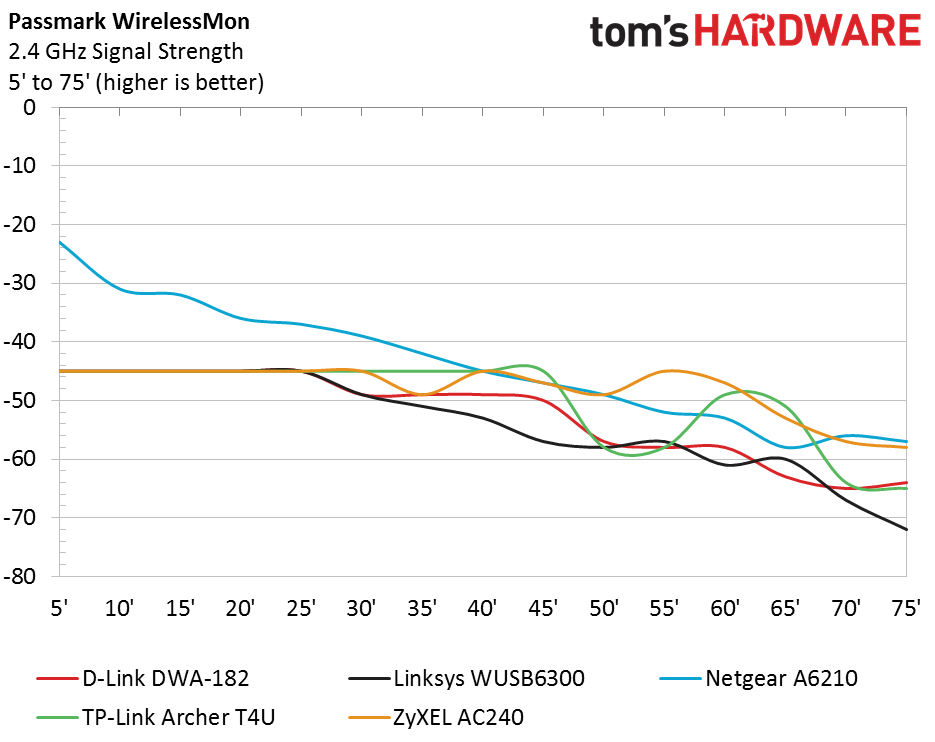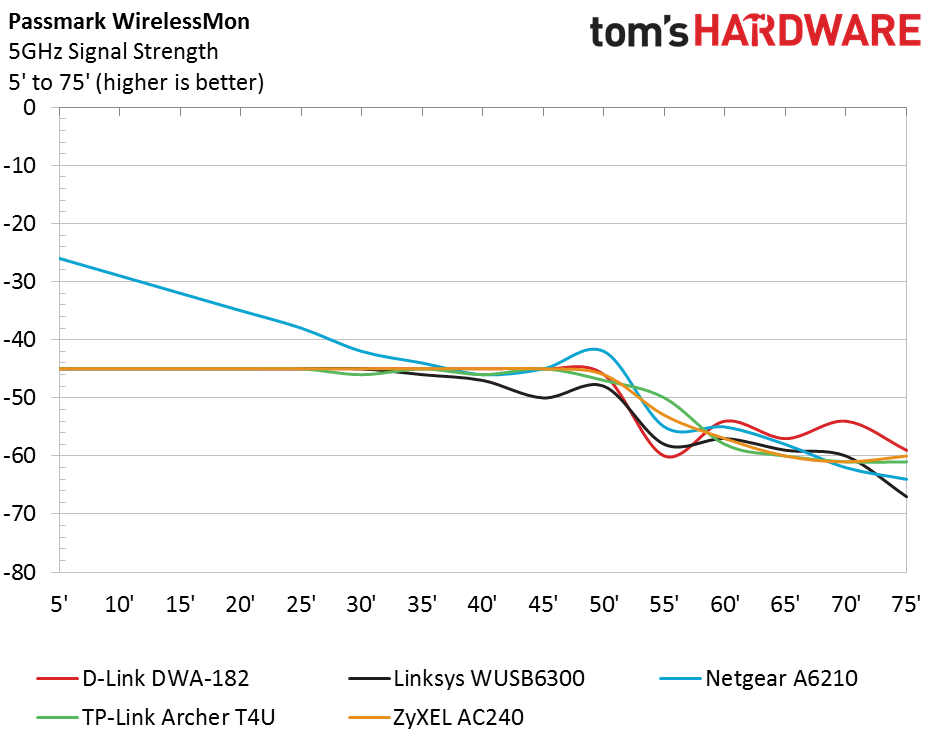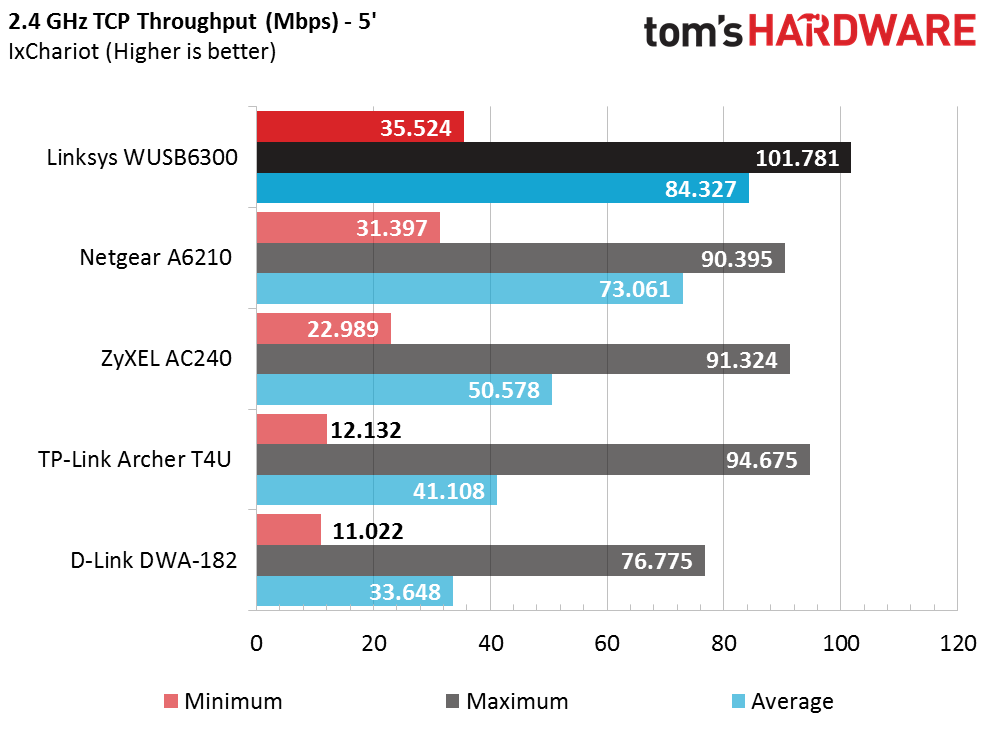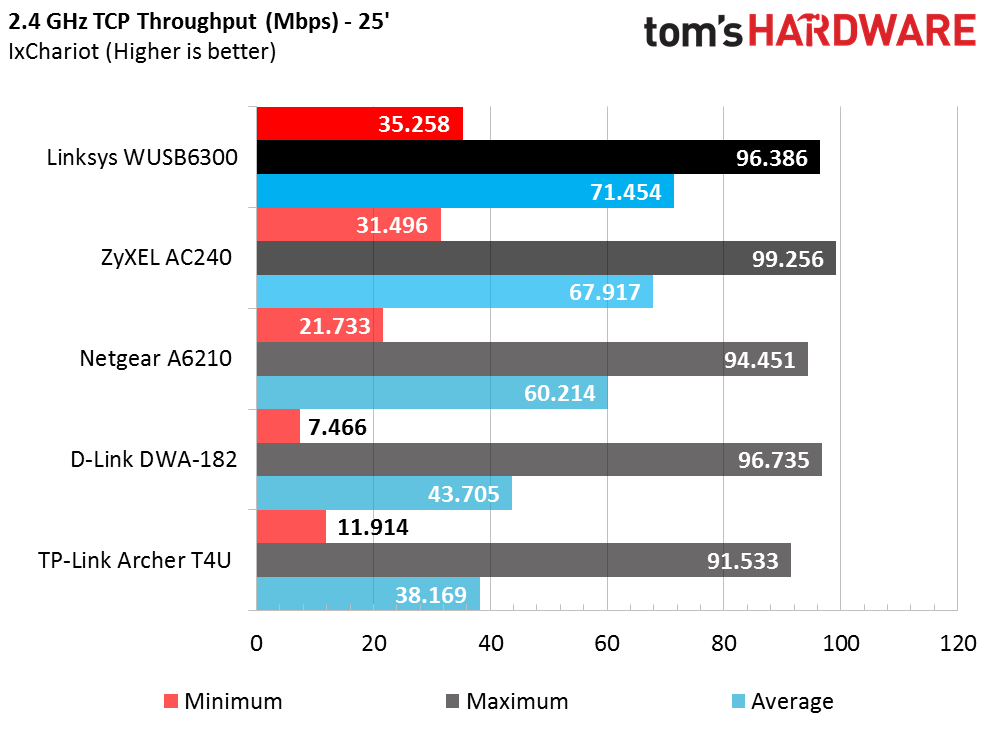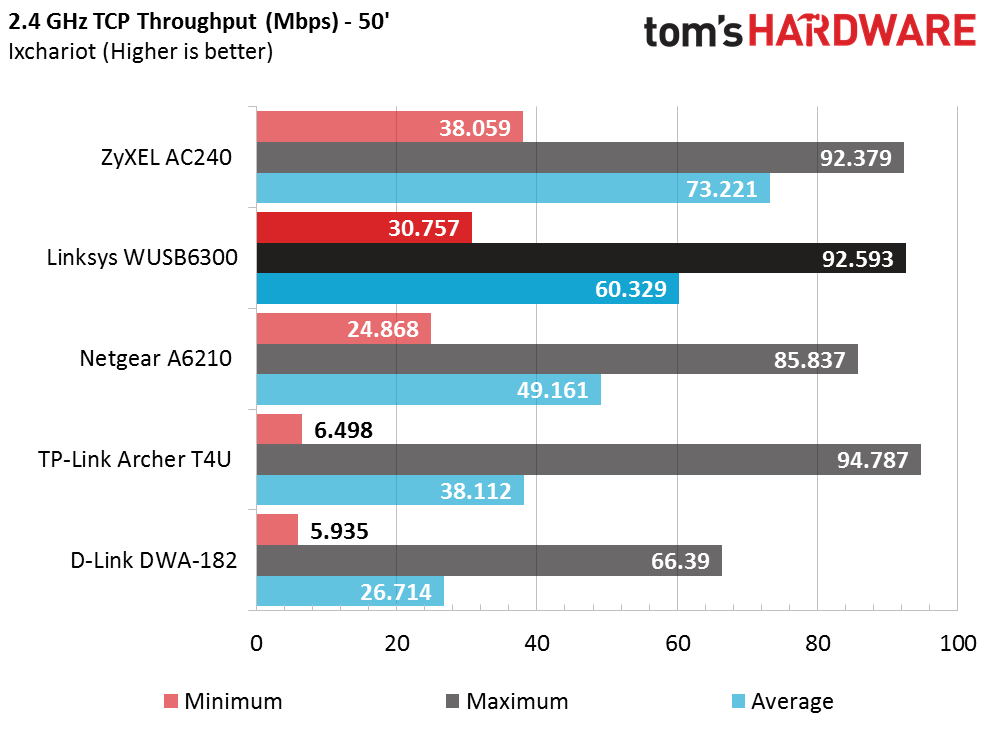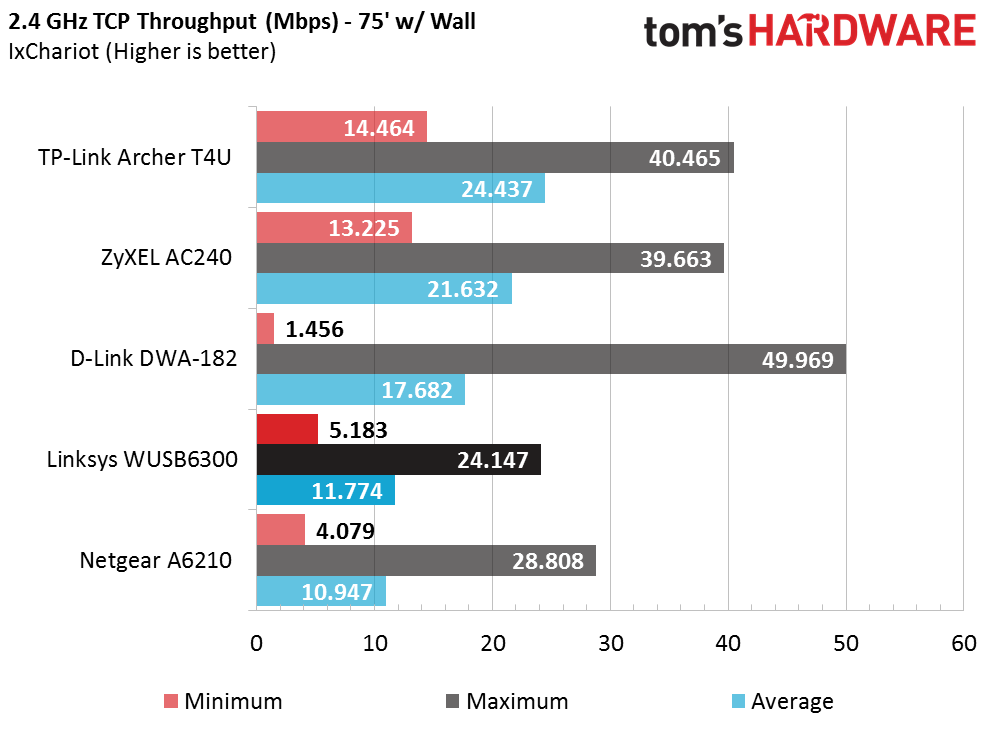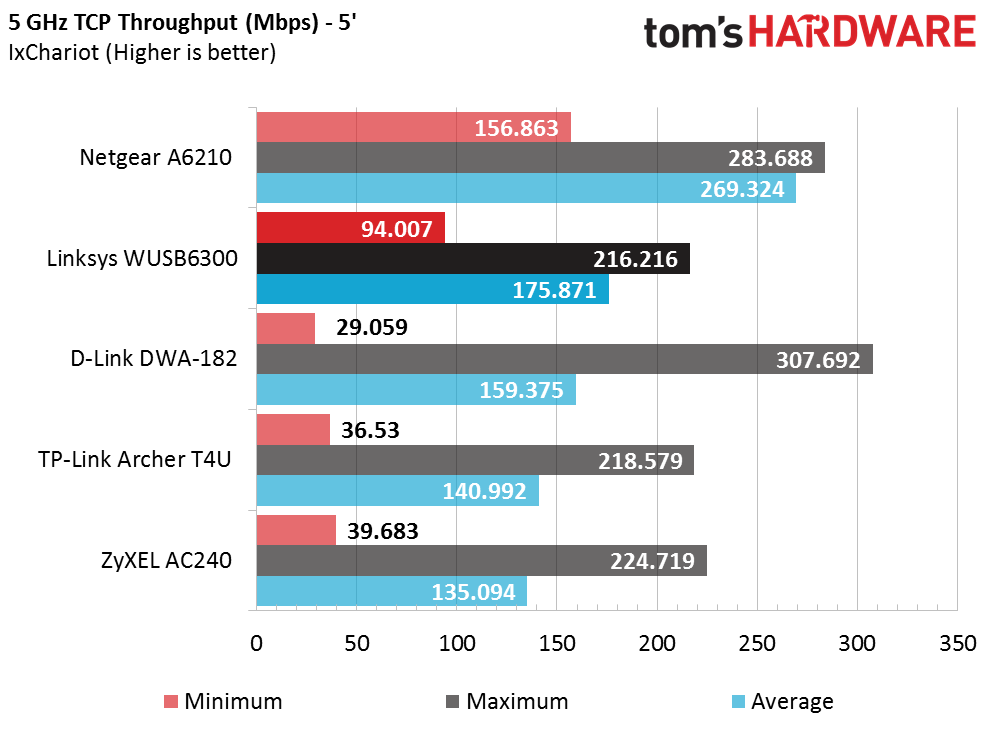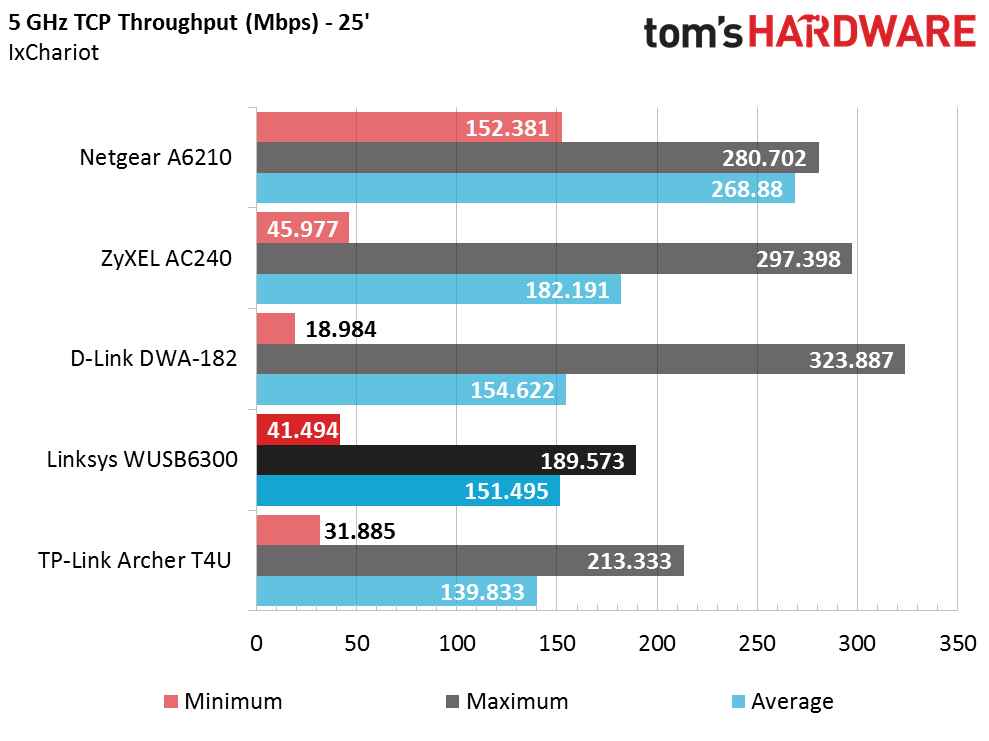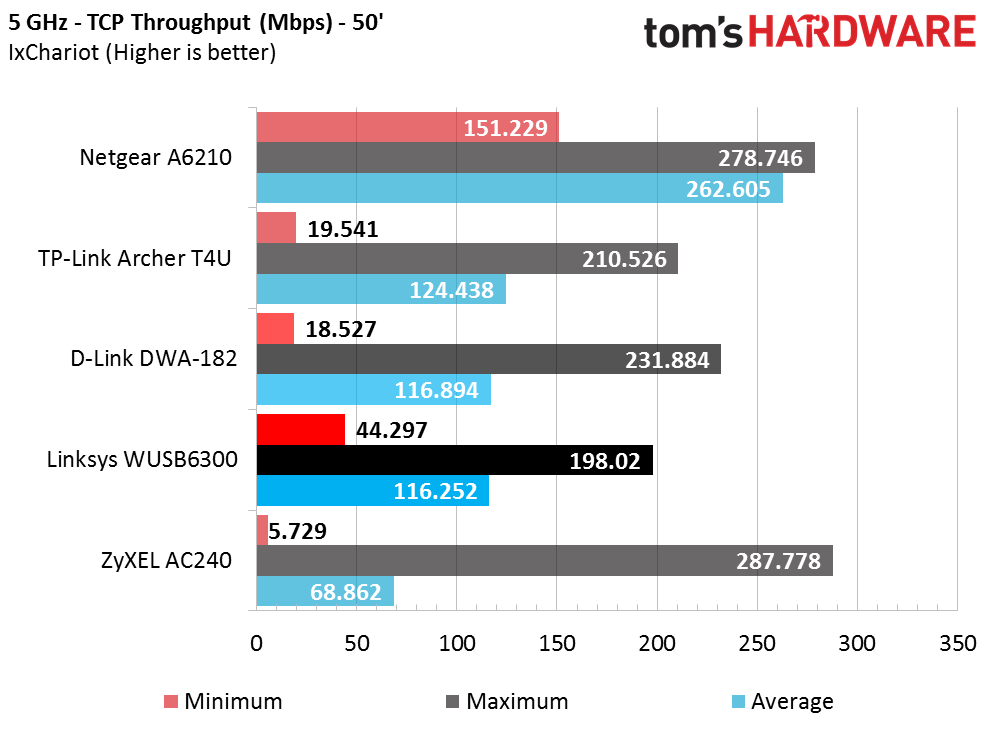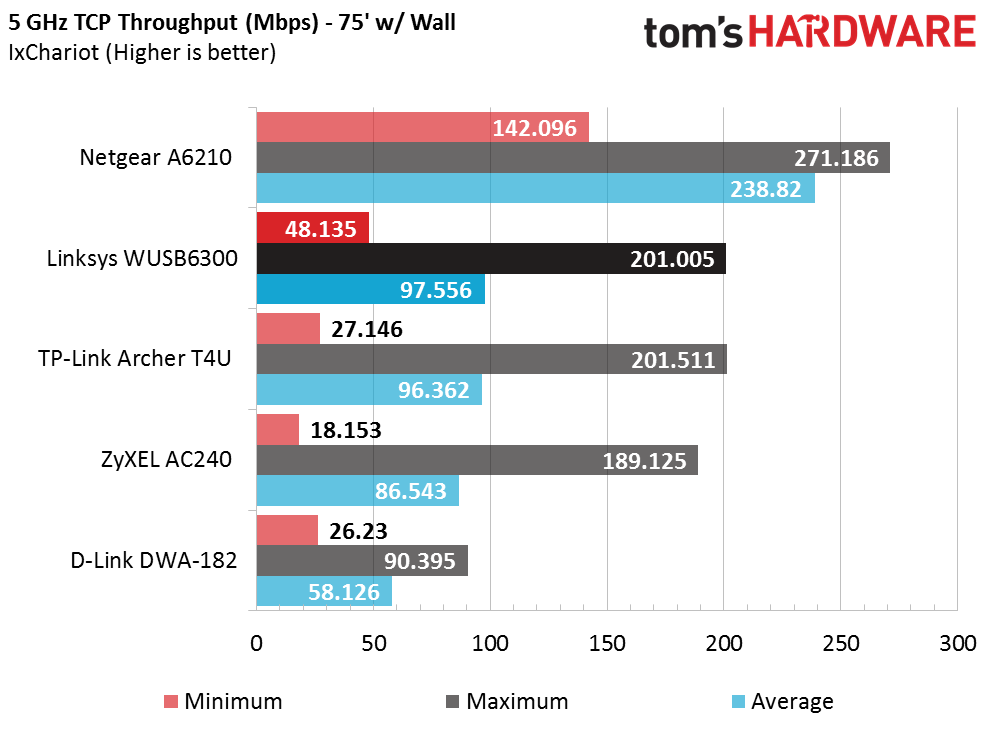Linksys WUSB6300 AC1200 Wireless-AC USB Adapter Review
How does 867Mb/s of throughput on the 5GHz wireless band sound? That's what Linksys' WUSB6300 promises, but can it keep up with more modern 802.11ac adapters?
Why you can trust Tom's Hardware
Test Results & Conclusion
We put the WUSB6300 through our entire Wi-Fi adapter testing suite. This is done in a standardized and reproducible fashion to generate reliable results. The test suite is detailed in How We Test USB Wi-Fi Adapters.
Signal Strength – PassMark WirelessMon
Although signal strength does not consistently correlate with maximum or average throughput speeds, it is still an indicator of link quality. After all, a strong signal is a good basis for uninterrupted transfers, while weak signals often lead to dropped connections.
The Linksys adapter's signal strength on the 2.4GHz band is disappointing. Although it starts out at the shorter ranges (up to 25 feet) similar to other adapters, beyond that it's comparatively weak.
Signal strength on the 5GHz band is similarly disappointing. Once again, the WUSB6300 starts out with the same signal strength as most other products, but then falls off in a linear fashion and, at most distances, is one of the weaker adapters tested.
Throughput - IxChariot
Throughput is tested with IxChariot, a network testing suite that Tom's Hardware uses to measure the throughput of wireless adapters. The Linksys WUSB6300 was tested at various distances on both the 2.4 and 5GHz bands. We then compared the results from other USB-attached Wi-Fi adapters to Linksys' offering. Measurements were collected across a one-minute test, showing minimum and maximum throughput in Mb/s on the 2.4GHz frequency at the four distances tested from the router: 5 feet, 25 feet, 50 feet and 75 feet.
From five feet away (from the router), Linksys actually takes the lead with a reported 84.3 Mb/s on average. Some USB adapters struggle when they are so close. And in general, an Ethernet cable is preferable at this distance. Still, the WUSB6300 shows that wireless connectivity is perfectly viable too.
At 25 feet out, Linksys continues showing strong performance. While all of the AC1200 USB adapters fare well, with maximum speeds higher than 90 Mb/s, the WUSB6300 finished in second place with a 71.4 Mb/s average.
Get Tom's Hardware's best news and in-depth reviews, straight to your inbox.
As we moved out to 50 feet, Linksys' WUSB6300 continued to demonstrate excellent maximum speeds, but slower minimums dropped the Linksys adapter into second place behind Zyxel, with an average of 60.3 Mb/s.
As we got out to 75 feet, low signal strength on the 2.4GHz band hurt the WUSB6300's throughput. It ended up in second-to-last place with an average of only 11.8 Mb/s.
Note that we had trouble with TRENDnet's TEW-805UB at this distance and couldn't report results for it.
Once again, five feet away from the router, Linksys excelled on the 5GHz band, showing that it wasn't affected by the interference that sometimes results in being too close. A 175.9 Mb/s average throughput measurement put it in second place.
Moving out to 25 feet, the WUSB6300 demonstrated a respectable 151.5 Mb/s. But in light of stiff competition, that's only good for second-to-last place. Linksys appears to be held back by its lowest maximum throughout at this distance.
From 50 feet away, Linksys continues to run into slower speeds. Its result of 116.2 Mb/s is less than half of the leading adapter, Netgear's A6210, resulting in a second-to-last-place finish.
Finally, we stepped outside of the office, 75 feet away from our test router. Despite reporting the lowest signal strength, curiously, Linksys' maximum transfer rate increased to 201.0 Mb/s (compared to the 198.0 Mb/s achieved at 50 feet). The average throughput at this distance was 97.6 Mb/s, putting it in second place at this distance.
The IxChariot results revealed that Linksys' WUSB6300 had better performance closer to the router. On both the 2.4GHz and 5GHz frequencies, throughput was much more stable from five feet away. In contrast, at the other extreme of 75 feet, Linksys struggled to maintain its connection on the 2.4GHz band, where it dropped off halfway through. On the 5GHz frequency, performance fluctuated quite a bit.
Conclusion
Our testing did expose some weaknesses. Signal strength issues from range are concerning, and this does translate to some class-trailing transfer rates as the distance to the router increases.
There are two issues that I believe contribute to a modest performance profile. First, this was one of the earliest AC1200 USB-attached adapters on the market, and its design is showing age. Second, the better-performing competition includes antennas that are discrete from the PCA, and not built in to the same circuit board. Although external antennas sacrifice the slim profile, they clearly have a meaningful impact on our throughput results.
While uneven performance is not particularly confidence-inspiring, at the right discounted price, Linksys' WUSB6300 serves as a capable wireless adapter, particularly if you're staying relatively close to your router. If you prioritize big transfer rates at long ranges, based on our results, there are better solutions available.
MORE: All Networking ContentMORE: Networking in the Forums
Jonas DeMuro is an Associate Contributing Writer for Tom's Hardware.
Follow us on Twitter @tomshardware, on Facebook and on Google+.

Jonas P. DeMuro is a freelance reviewer covering wireless networking hardware.
-
dstarr3 ReplyWould a $2 USB extension cord turn this limp dog into a winner?
Possibly, but considering the majority of the competing products ship with an extender, it really should be a knock against this that it doesn't. -
Erik_1 I really wish wireless adapters included testing with maximum encryption turned on over a week. Most of the devices I've ever bought overheat very quickly, and overheat faster with encryption enabled. In other words, they're all pretty useless. So long as no one tests this way they can keep producing barely useful products.Reply
